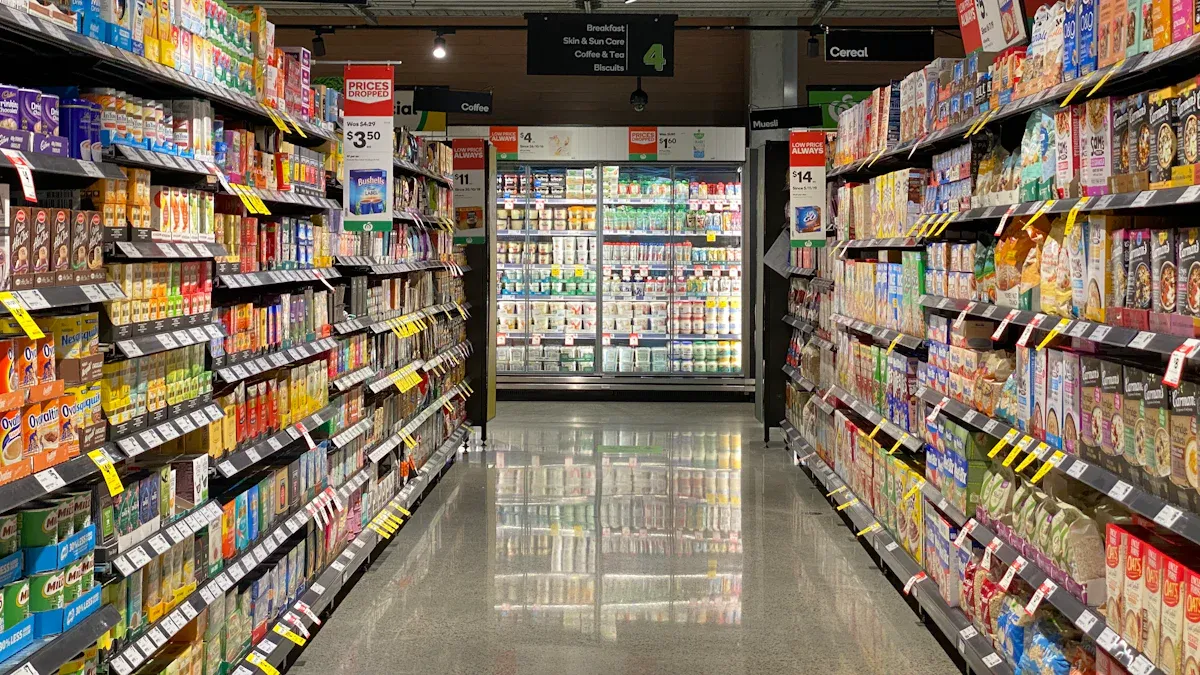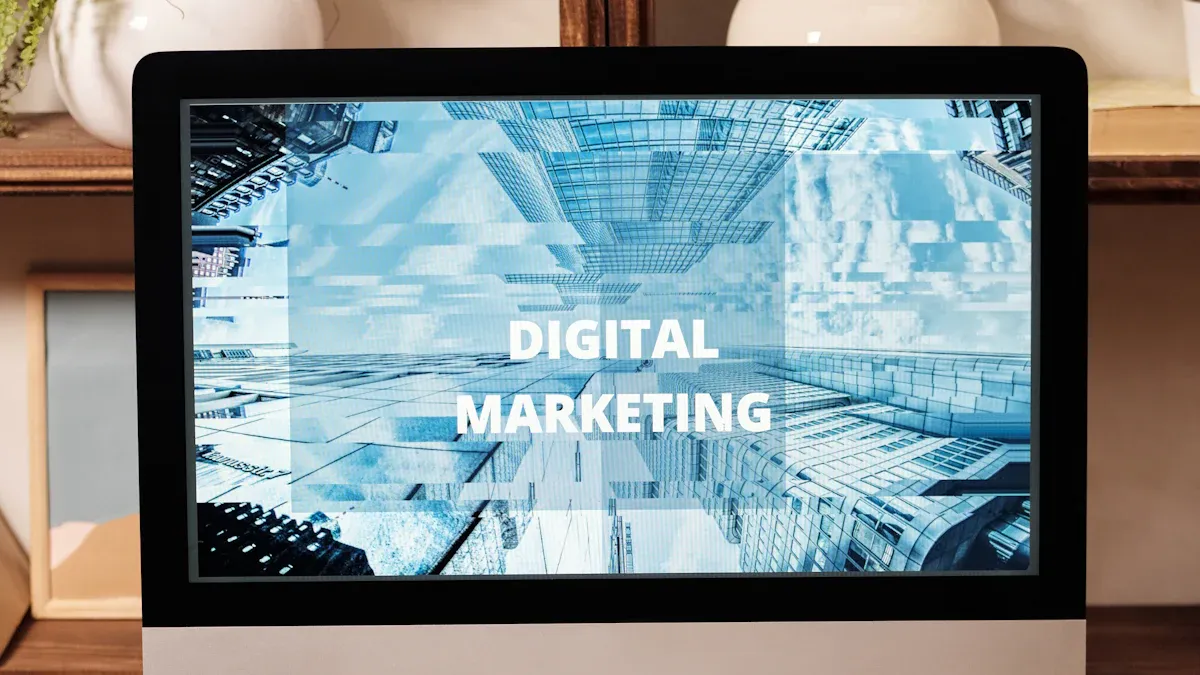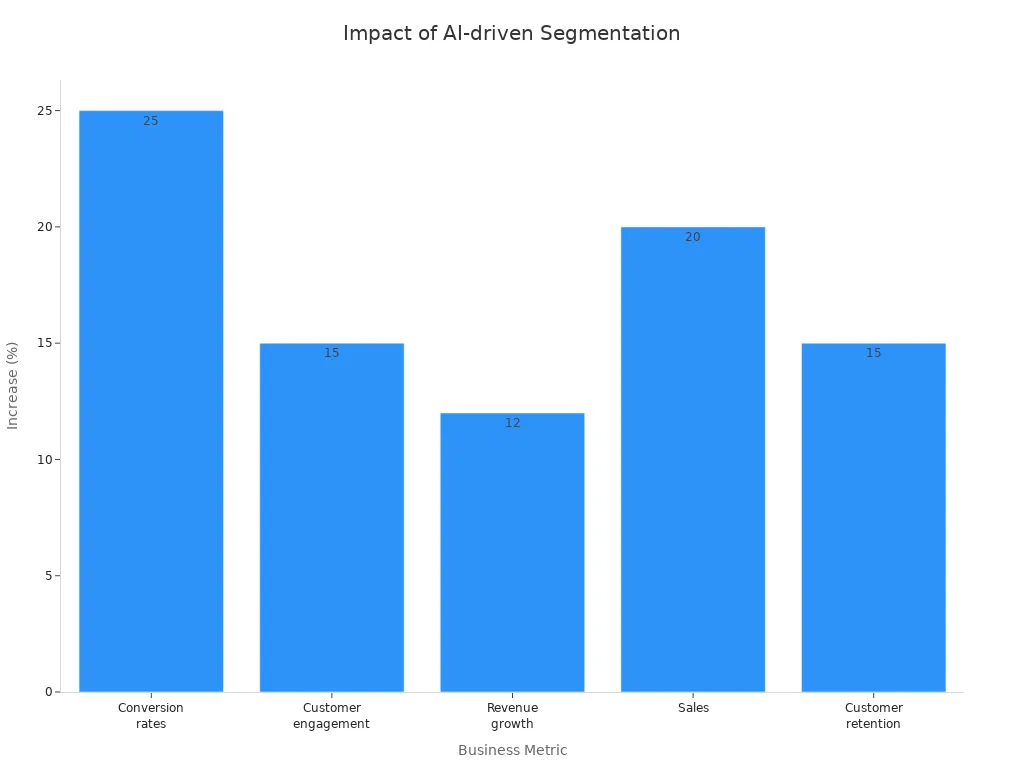Top marketing automation strategies for unmanned retail stores

You can boost your unmanned retail store with marketing automation strategies like personalized promotions, AI-powered segmentation, automated loyalty programs, and real-time notifications. Automation helps you solve challenges unique to cashier-less environments, such as improving customer service, streamlining tasks, and reducing costs. The industry is growing fast, with the global market expected to reach $616.7 billion by 2034.
Year | Market Size (in billion USD) | CAGR (%) |
|---|---|---|
2024 | 66.2 | 21.24 |
2029 | 207.2 | 25.62 |
2034 | 616.7 | 24.38 |
AI, data analytics, and sustainable practices make these stores more efficient and eco-friendly.
Key Takeaways
Use personalized promotions to connect with customers. Tailor offers based on their shopping habits to increase loyalty and sales.
Implement AI customer segmentation to send the right messages at the right time. This can boost conversion rates and enhance customer satisfaction.
Automate loyalty programs to reward returning customers easily. This encourages repeat visits and builds a strong customer base.
Utilize real-time notifications to keep shoppers informed about sales and new products. This enhances engagement and improves the shopping experience.
Leverage inventory analytics to maintain optimal stock levels. This reduces waste and ensures customers find what they need.
Unmanned retail overview

Unmanned or cashier-less stores let you shop without waiting in line or dealing with cashiers. These stores use advanced technology to track what you pick up and charge you automatically when you leave. You will find sensors, cameras, artificial intelligence, and mobile apps working together to make your shopping experience smooth and fast. Some well-known examples include Amazon Go, 7-Eleven Shop & Go, Aisle 24, and Moby Mart.
Smart retail trends
You see many new trends shaping unmanned retail. The demand for contactless shopping has grown, especially after the COVID-19 pandemic. Shoppers like you want safer, faster, and more convenient ways to buy what you need. Stores use technology to meet these needs.
Technology | Benefit for Stores | Benefit for Shoppers |
|---|---|---|
RFID tags | Real-time stock tracking | Always find popular products |
Smart shelves | Automatic reordering when stock runs low | No more out-of-stock frustrations |
AI-driven analytics | Optimize inventory and reduce waste | Better product availability |
You also benefit from touch-free payment options and quick checkouts. AI and computer vision help stores prevent theft and improve product identification. Mobile apps make payments even easier.
Cost and sustainability
As the cost of technology drops, unmanned stores can slowly replace traditional stores. You do not need to worry about staff turnover or training. This shift moves costs from hiring and training staff to investing in technology and infrastructure.
Unmanned stores help lower operational costs and reduce environmental impact. Studies show that these stores can use less energy and resources, making them more sustainable. You help the environment by shopping at stores that focus on efficiency and waste reduction. As the market grows, you will see more stores using marketing automation strategies to improve both cost savings and sustainability.
Marketing automation strategies

You can use several marketing automation strategies to make your unmanned retail store smarter and more efficient. These strategies help you connect with shoppers, improve sales, and keep your store running smoothly. Let’s look at each one and see how you can put them into action.
Personalized promotions
Personalized promotions let you offer deals that match each shopper’s interests. You can use data analytics to learn what your customers like and what they buy most often. When you know their habits, you can send them special offers that feel just right for them.
Steps to implement personalized promotions:
Use your store’s data to recommend products based on past purchases.
Send special discounts to customers who visit often.
Offer rewards for buying certain items or shopping during specific times.
Study demand patterns to make sure you always have popular products in stock.
Stores like Aisle 24 use these marketing automation strategies to give shoppers a more personal experience. When you get a coupon for your favorite snack or a reminder about a sale, you feel valued and are more likely to return.
AI customer segmentation
AI customer segmentation helps you group shoppers by their habits and preferences. Artificial intelligence looks at data from many sources, such as purchase history and shopping times. This lets you send the right message to the right person at the right time.
Feature | How it Helps You |
|---|---|
Data Integration | AI combines data from different places to understand what you like. |
Real-time Adaptability | AI changes groups as trends shift, so your offers stay fresh and interesting. |
Predictive Analytics | AI guesses what you might want next, so you see offers that fit your needs. |
Personalization | AI makes sure you get messages and deals that matter to you. |
When you use AI-powered segmentation, you see big results. Companies that use these marketing automation strategies report a 25% increase in conversion rates and a 20% boost in sales. You can also see higher customer satisfaction and better engagement.

Automated loyalty
Automated loyalty programs reward your customers for coming back. You can set up systems that track purchases and give points or rewards automatically. This makes it easy for shoppers to join and stay engaged.
Key Feature | Benefit for You |
|---|---|
Easy enrollment | Sign up quickly, so you start earning rewards right away. |
Loyalty program cards | Use your phone to track points, which is better for the environment. |
Personalized rewards | Get rewards that match your shopping habits. |
Multi-tiered structure | Earn more benefits as you shop more often. |
Customizable options | Choose rewards that you actually want. |
Event-triggered rewards | Celebrate milestones with special offers. |
A global airline group grew its loyalty program to 40 million members by making it easy to join and offering rewards that fit each customer. When you use these marketing automation strategies, you gather data that helps you make your offers even better.
Real-time notifications
Real-time notifications keep your customers informed and engaged. You can send alerts about sales, new products, or even when an item is back in stock. These messages can pop up on a shopper’s phone as soon as they enter your store or walk by a certain area.
Best ways to use real-time notifications:
Send a special offer when a shopper enters a specific aisle.
Remind customers about items left in their online basket.
Alert shoppers to price drops or new arrivals.
Use smart technology to warn about equipment issues or security concerns.
Best Practice | How It Helps You |
|---|---|
Real-Time Alerts | Get instant updates about important events in the store. |
Automated Responses | Let the system take action, like locking doors or adjusting lights, right away. |
Live Video Monitoring | Use cameras to check on the store and solve problems quickly. |
When you use these marketing automation strategies, you make shopping easier and more fun for your customers. Personalized messages can boost sales and keep shoppers coming back.
Inventory analytics
Inventory analytics help you keep the right products in stock and avoid running out or having too much. You can use automation and AI to track every item, check expiration dates, and even spot trends before they happen.
Feature | How it Helps You |
|---|---|
Inventory Data Management | Track lot numbers, expiration dates, and more for better accuracy. |
Automation in Inventory | Use robots and software to move and count items, saving time and effort. |
Visual Proof & Audit Log | Keep records and photos to prevent mistakes and build trust. |
Accurate Order Fulfillment | Make sure every order is correct, which keeps customers happy. |
Retailers using predictive analytics have cut overstock and stockouts by up to 30%. Some stores have reduced stockouts by 35%, which means shoppers like you can always find what you need. These marketing automation strategies help you run your store more efficiently and reduce waste.
Store optimization with AI
Customer movement tracking
AI-equipped cameras and analytics help you understand how shoppers move through your store. These smart systems watch where people walk, stop, and spend the most time. You can use this information to make better decisions about your store’s design and product placement.
AI cameras collect real-time data on foot traffic patterns.
Computer vision technology creates heat maps that show high-traffic areas.
Object detection tools track how shoppers interact with products and navigate aisles.
You can see which displays attract the most attention and which areas get ignored.
When you know where customers spend the most time, you can place popular products in those spots. You also learn which paths shoppers take most often. This helps you reduce crowding and improve the flow of your store. By predicting crowd sizes and wait times, you can make shopping faster and more enjoyable.
Tip: Use heat maps from your AI system to spot “hot zones” in your store. Move best-selling items to these areas to boost sales.
Layout optimization
Once you track customer movement, you can use AI insights to design the best store layout. AI helps you test different layouts and find the one that works best for your shoppers. You can make changes quickly and see how they affect sales and customer satisfaction.
Strategy Type | Description |
|---|---|
Grid Layout | Organized navigation, ideal for grocery stores. |
Loop Layout | Guides shoppers past maximum merchandise, suitable for department stores. |
Free-Flow Layout | Creates intimate experiences, often used in boutiques. |
Strategic Placement | Decompression zones at entrances help shoppers adjust to the store environment. |
Impulse Purchase Zones | Located near checkouts and main walkways to encourage spontaneous buying. |
Rest Areas | Placed every 250 meters to keep customers comfortable and engaged. |
Central Attractions | Features like art or fountains draw shoppers deeper into the store. |
Tenant Mix Strategy | Groups similar businesses together to promote cross-shopping and anchor tenants strategically. |
You can use these strategies to create a store that feels welcoming and easy to shop in. AI-driven insights help you place products where they will sell best and design a layout that keeps customers coming back. This leads to a better shopping experience and higher sales.
Integrating automation tools
Bringing together different automation strategies helps you create a smooth and enjoyable shopping experience in your unmanned retail store. When you combine tools for promotions, loyalty, notifications, and inventory, you make every step easier for your customers. You also boost your store’s efficiency and keep your business running well.
Unified platforms
Unified platforms let you manage many automation tasks from one place. You can track sales, send promotions, and analyze customer data without switching between systems. These platforms use artificial intelligence and smart analytics to help you make better decisions.
Platform | Description |
|---|---|
Omnistream | Uses AI-driven data insights to optimize store-level assortments and planograms, enhancing profitability and customer experience. |
Harmonya | Unifies and enriches product data across silos, enabling holistic analytics and smarter retail decisions. |
iGenius | Offers a conversational AI business intelligence assistant for instant insights across store KPIs. |
Shopic | Transforms any cart into a smart self-checkout experience using computer vision, boosting speed and satisfaction. |
Ema | Deploys “AI employees” to automate store admin tasks like reporting, scheduling, and internal support. |
Osmos | Automates data ingestion and system integration, breaking down silos across retail operations. |
D-ID | Brings interactive digital avatars to in-store or online customer engagement experiences. |
You can use these platforms to connect your store’s systems. This helps you personalize recommendations and make transactions seamless. Apple’s handheld devices and Harrods’ customer profiling tools show how automation can lead to tailored service and faster checkouts.
Tip: Choose a platform that fits your store’s size and needs. Look for tools that work well together and offer easy integration.
Performance measurement
Measuring how well your automation tools work is important. You need to know if your strategies help you reach your goals. Start by tracking key performance indicators (KPIs) like sales growth, customer retention, and inventory turnover. Use dashboards and reports from your unified platform to see trends and spot problems quickly.
Set clear goals for each automation strategy.
Check your KPIs often to see what works best.
Adjust your tools and tactics based on the data you collect.
When you measure performance, you find ways to improve your store. You can make changes that help your customers and grow your business. Automation gives you the power to act fast and stay ahead in the unmanned retail market.
You can transform your unmanned retail store by using marketing automation strategies. These tools help you personalize promotions, segment customers with AI, automate loyalty programs, send real-time notifications, and manage inventory. To get started, follow these steps:
Choose the right tools for your business.
Build your customer database.
Develop automated workflows.
Monitor and optimize your results.
You gain a competitive edge when you use technology to improve efficiency and customer experience.
Seamless checkout and personalized service attract more shoppers.
Automated systems lower costs and boost performance.
Start evaluating your current systems today. Adopt automation to grow your store and support sustainability.
FAQ
What is marketing automation in unmanned retail stores?
Marketing automation uses technology to handle tasks like sending promotions, tracking inventory, and managing loyalty programs. You set up systems that work without human help. This makes your store run smoothly and helps you connect with shoppers.
How does AI improve customer experience in cashier-less stores?
AI studies shopping habits and predicts what you want. You get personalized offers and quick service. AI also helps stores keep popular products in stock. This makes your shopping trip easier and more enjoyable.
Can automation help reduce costs in unmanned stores?
Yes! Automation replaces manual work, so you spend less on staff and training. You use smart tools to track inventory and sales. This helps you avoid waste and save money.
What tools can you use for marketing automation?
You can use unified platforms like Omnistream, Harmonya, and Shopic. These tools help you manage promotions, loyalty programs, and inventory. You control everything from one dashboard.
Is marketing automation safe for customer data?
Most automation tools use strong security to protect your information. You should choose platforms with data encryption and privacy controls. This keeps your personal details safe while you shop.
See Also
Transforming Online Store Management With AI-Driven E-Commerce Tools
The Future of Retail Lies in AI-Enhanced Stores
Essential Insights on AI-Driven Corner Stores for Retailers
Modern Retail Benefits From Features of AI-Enhanced Vending Machines
Revolutionizing Retail: The Impact of Smart Electronics Vending Machines
